These are election results in 1901 to the United States House of Representatives:
These are election results in 1901 to the United States House of Representatives:
| District | Incumbent | This race | |||
|---|---|---|---|---|---|
| Member | Party | First elected | Results | Candidates | |
| Maine 4 | Charles A. Boutelle | Republican | [ data unknown/missing ] | Incumbent member-elect resigned during previous congress. New member elected April 8, 1901. Republican hold. |
|
| Texas 6 | Robert E. Burke | Democratic | 1896 | Incumbent died June 5, 1901. New member elected July 13, 1901. Democratic hold. |
|
| Michigan 10 | Rousseau O. Crump | Republican | [ data unknown/missing ] | Incumbent died May 1, 1901. New member elected October 15, 1901. Republican hold. |
|
| New York 24 | Albert D. Shaw | Republican | [ data unknown/missing ] | Incumbent member-elect died during previous congress. New member elected November 5, 1901. Republican hold. |
|
| Pennsylvania 10 | Marriott H. Brosius | Republican | [ data unknown/missing ] | Incumbent died March 16, 1901. New member elected November 5, 1901. Republican hold. |
|
| South Carolina 7 | J. William Stokes | Democratic | 1894 | Incumbent died July 6, 1901. New member elected November 5, 1901. Democratic hold. Winner was seated December 2, 1901. [1] Successor also elected the same day to the next term, see below. |
|

Charles Arnette Towne was an American politician.
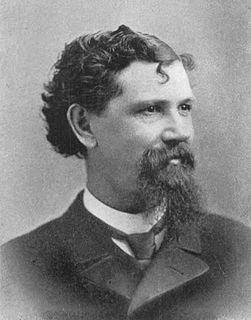
Henry Harrison Aplin was an American Civil War veteran, businessman, and politician from the U.S. state of Michigan. He served one term in the United States House of Representatives from 1901 to 1903.

William Pierce Frye was an American politician from Maine. A member of the Republican Party, Frye spent most of his political career as a legislator, serving in the Maine House of Representatives and then U.S. House of Representatives, before being elected to the U.S. Senate, where he served for 30 years before dying in office. Frye was a member of the Frye political family, and was the grandfather of Wallace H. White Jr., and the son of John March Frye. He was also a prominent member of the Peucinian Society tradition.
The 1902 United States House of Representatives elections occurred in the middle of President Theodore Roosevelt's first term, about a year after the assassination of President William McKinley in September 1901.
The 1900 United States House of Representatives elections were held, coinciding with the re-election of President William McKinley.
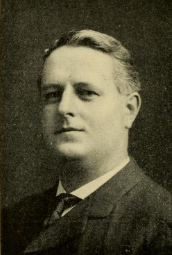
Edward Gilmore was a United States representative from Massachusetts. He was born in Brockton, Massachusetts. He attended the public schools, and Massachusetts State University extension classes. He engaged in mercantile pursuits. He was a member of the Democratic State committee 1896–1903, and was a delegate to the Democratic National Conventions in 1900 and 1904. He served as president of the Brockton Board of Aldermen 1901–1906.

John Henry Gear served as the 11th Governor of Iowa, a United States representative and a member of the United States Senate.
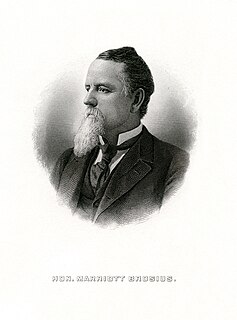
Marriott Henry Brosius was a Republican member of the U.S. House of Representatives from Pennsylvania.
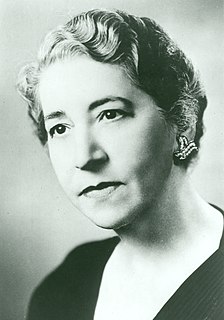
Catherine Dorris Norrell was the third woman in Arkansas history to gain a seat in the United States House of Representatives.
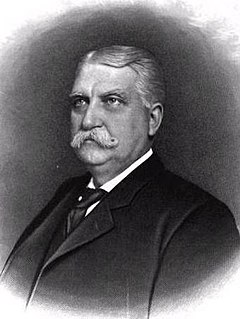
George Warren Weymouth was a U.S. Representative from Massachusetts.
William Leake Terry was an American attorney and politician who served as a member of the United States House of Representatives for Arkansas's 4th congressional district from 1891 to 1901.

John Peter Cleaver Shanks was a U.S. Representative from Indiana from 1867 to 1875 and an officer in the Union Army during the American Civil War.
The 1900 and 1901 United States Senate elections were elections in which the Democratic Party gained two seats in the United States Senate, and which corresponded with President William McKinley's landslide re-election. By the beginning of the next Congress, however, the Republicans gained five additional seats, giving them a ten-seat majority.

The Boston mayoral election of 1901 occurred on Tuesday, December 10, 1901. Democratic candidate Patrick Collins defeated Republican candidate and incumbent Mayor of Boston Thomas N. Hart, and two other contenders.
There were nine special elections to the United States House of Representatives in 1899 during the 56th United States Congress, which began on March 4, 1899. None of the special elections in 1899 were during the 55th United States Congress, which ended March 3, 1899.